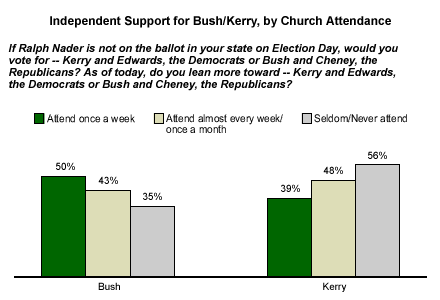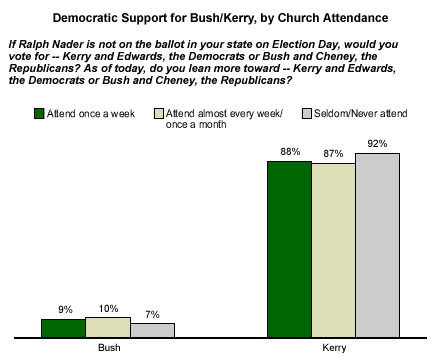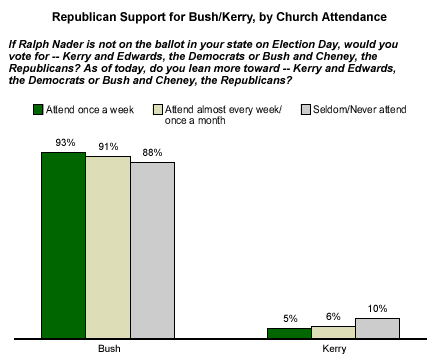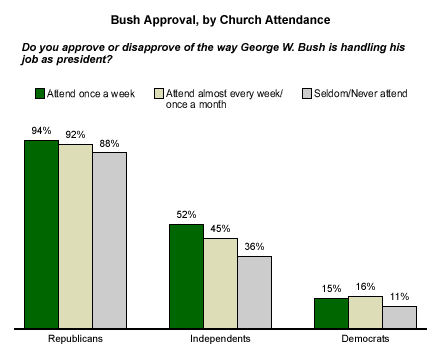Much has been made this election year about the "religion gap" among voters. Most polls, including Gallup's, show that individuals who regularly attend religious services are much more likely to vote for George W. Bush than John Kerry. This gap was first noted in the 2000 election, when regular churchgoers voted in far greater numbers for George W. Bush than for Al Gore. This year, media pundits and analysts have gone as far as to state that church attendance is the single biggest predictor of voting behavior.
That statement may seem rational, but to some extent it's a case of putting the cart before the horse. There is a simple reason why churchgoers tend to support Bush over Kerry -- a reason that has been constant since Franklin D. Roosevelt was president. Republicans attend religious services more often than do Democrats and independents.
According to a recent Gallup Poll*, 45% of Republicans attend church or synagogue at least weekly, compared with 31% of Democrats and 28% of independents. Conversely, 35% of Republicans seldom or never attend church or synagogue, compared with 48% of Democrats and 47% of independents. These proportions have remained fairly consistent over nearly seven decades of Gallup polling.
Support for Bush among weekly churchgoers can be partially explained by the fact that more Republicans attend worship services weekly than either Democrats or independents. But what is the main driver of support for Bush in this election -- religiosity or partisanship? It's a combination of both, since political preferences are so intertwined with one's values. But when partisanship and religiosity are looked at separately, politics still trumps religion.
Vote Intentions
The idea that the United States is a nation divided by party lines rather than religious lines is obvious when looking at how few Americans are willing to support the presidential candidate of the other party according to their level of religiosity. The graphs break out respondents from the third quarter of this year -- six surveys between July and September** -- first by which political party they prefer, then by the frequency with which they say they attend church. Regardless of their churchgoing habits, 10% or less of Republicans and Democrats said they plan to cross party lines when they vote for president (although Republicans who seldom or never attend church were slightly more likely to say they planned to vote for Kerry than those who attend every week).
Interestingly, among political independents there are significant differences according to religious behavior. Those independents who say they attend church weekly were more likely to say they'll vote for Bush, 50% vs. 39%, while non-churchgoers favored Kerry, 35% to 56%. The implication? Party preference easily trumps religiosity when it comes to voting behavior -- but among the roughly 30% of Americans who expressed no party preference in these surveys, their religious orientation may certainly factor into their candidate choice.

Why So Strong for Bush?
Another common measure allows us to examine the relationship between political attitudes and religious behavior from a slightly different angle. In Gallup's long history of tracking the president's approval rating, views of the president have never been as starkly partisan as they are now: According to the latest Gallup Poll, 93% of Republicans approve of the way Bush is handling his job, while only 11% of Democrats approve and 42% of independents approve -- the national average is 48%.
This strength of support for Bush holds steady among all Republicans, regardless of how often they attend church, while support among Democrats and independents varies somewhat depending on their level of church attendance.

During the first three quarters of 2004, approval of Bush among Republican weekly church attendees has remained in the low 90s, while support among Republicans who attend nearly weekly or monthly has been in the upper 80s and low 90s. Republicans who seldom or never attend church also strongly support Bush -- approval among this group has ranged between 86% and 88% in 2004.

Just as Bush approval is high among Republicans regardless of church attendance, Bush approval is universally low among Democrats regardless of church attendance. Aggregated data from the third quarter of 2004 show that 15% of weekly churchgoing Democrats approve of the job Bush is doing, compared with 16% of Democrats who attend church almost every week or once a month, and 11% of Democrats who seldom or never attend church.

Independents, however, follow a different pattern. Churchgoing independents are somewhat more likely than non-churchgoing independents to support Bush. Fifty-two percent of weekly churchgoing independents approve of Bush, compared with 45% of monthly attendees and 36% of those who seldom or never attend. Bush approval among independents who seldom or never attend church has dropped since early 2004, from 46% in the first quarter to 36% in the second and third quarters.
It's Still the Party Above All Else
Party identification, more than any other factor, is still the best predictor of voting behavior. This may seem obvious, but it is worth pointing out because this simple fact often gets drowned out in the whirlwind of election noise. On the surface, it seems that Bush is popular among regular churchgoers. But it is Republican churchgoers who are driving these numbers most strongly.
* These results are based on telephone interviews with a randomly selected national sample of 1,015 adults, aged 18 and older, conducted Oct. 9-10, 2004. For results based on this sample, one can say with 95% confidence that the maximum error attributable to sampling and other random effects is ±3 percentage points. In addition to sampling error, question wording and practical difficulties in conducting surveys can introduce error or bias into the findings of public opinion polls.
**Aggregated data from six surveys spanning July to September, 2004. Sample sizes: Republicans -- 2,383; independents -- 1,926; Democrats -- 2,229. For results based on this sample, one can say with 95% confidence that the maximum error attributable to sampling and other random effects is ±2 percentage points.
